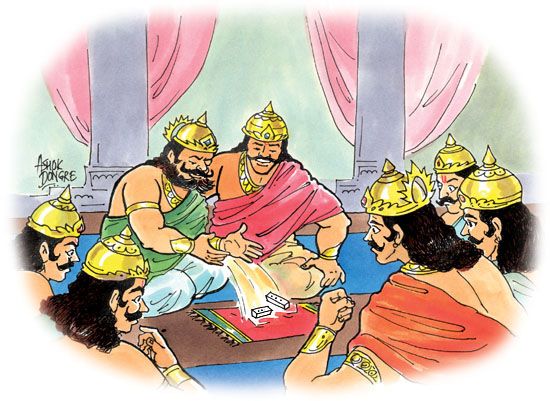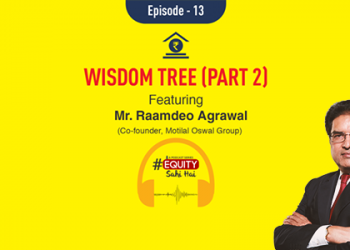Mahabharata, needless to say, is one of the greatest epics in Hindu mythology written by Sage Vyas. It is known to offers valuable lesson on life, relations, success and it is essentially the narrative of a war between the Kauravas and the Pandavas; the good and the bad; the virtuous and the vile. This epic offers valuable lessons to differentiate the good from the bad. Read 5 Key investing lessons from the Mahabharata here;
Knowledge is your ‘Divyastra’

Arjuna, Bheema and Yudhisthra undertook long hard journey to obtain Divyastras, strength and strategic wisdom much before the actual battle of Mahabharata, which held them in good stead in the most important juncture of their lives. Arjuna kept learning all his life. He learnt military science from Drona, divine weapons from Indra, Pashupatasthra from Mahadev and treated Yudhishtra and Krishna as his guide all life too.
To learn more is to grow more and achieve more. Knowledge in investing helps us in growing our investments. Unfortunately, not many are aware of the various investment options one has to secure their earnings or grow them. Similarly, the inadequacy of knowledge of Mutual Funds amongst investors and potential investors acts as a barrier in achieving their goals or creating wealth. Whereas, a certain number of investor have achieved their financial goals and created wealth by keeping themselves updated by reading and researching on Mutual Funds or by consulting a financial advisor. Taking a cue from the epic Mahabharata, it could be said that ‘knowledge’ is no less than a ‘Divyastra’ that may help us in achieving our financial goals, securing the future of our loved ones and may help in creating wealth.
Towards goal based planning and periodic monitoring

During one of their training sessions, Dronacharya took the young princes to an open area. There on a tree was hanging a wooden bird. The task was to shoot its eye from a distance. Guru, asked all disciples on what they could see while aiming on the bird. Everyone answered seeing the bird, trees, its feathers, ground, etc. Arjun answered that he could only see the bird’s eye which had to be shot and nothing else. He also successfully brought down the bird with one arrow by hitting the eye of the bird.
Come what may, to achieve ones financial goals and not lose their sight, one needs to identify the goals and stick to them. One needs to ignore the market theatrics regardless of how much the noise penetrates into your mind and tries coercing you to give up. It is also advisable to identify Mutual Fund schemes according to the time horizon of your goals. Investors should monitor their portfolio as deemed fit to stay updated and not panic during short-term volatilities.
Over-diversification led to their doom

In the key battle of the Mahabharata, the Pandavas consisting of just 5, brothers could eventually defeat the Kaurava clan of 100 brothers. It’s easy for a leader to communicate and be able to head 5 people than from a team of 100!
As mentioned above, it is evident that the disharmony ins a huge team led to the defeat of the Kaurava clan. Similarly, in investments too, it gets difficult to keep a track of too many portfolios. And hence, it’s suggested to stick to schemes or products with a focused portfolio consisting of less number of stocks, say 20-25 stocks. This is an example that over-diversification does not create value.
Do not follow things blindly

Abhimanyu, the son of Arjun & Subhadra had entered the Chakravyuh alone (man-made maze on the battle field) with partial knowledge of breaking it. The background is that when in his mother’s womb, Arjun was narrating how to break the Chakravyuh to Subhadra when half way through the story, she fell asleep. Abhimanyu thus could not learn the full technique yet entered the Chakravyuh and got killed, as he could not exit the same.
In the investment space too, investors may tend to act without thinking or may panic during market volatility. The lack of knowledge about a subject may lead them to in making wrong investment decision. This further leads to from achieving financial goals. Before investing in any scheme, an investor should read the scheme details thoroughly or consult with a financial advisor. Also, a financial advisor can help the investor during market turbulence by counselling him with his conviction and not letting the investor fall prey to market volatility.
Keep it simple; do not complicate

Shakuni was an expert at the game of dice. He conspired to call on Pandavas to Hastinapur and then helped Duryodhana win the game of gambling against them. Yudhistra not just lost his kingdom and other assets but his brothers and wife too. On being restored their wealth by Dhritrashtra, they again lost everything in the second round and were sent to exile for 13 years.
In the investment world too, the same theory can be applied. Being an investor, if you are unable to identify the risk and returns or alternative investment options available; just learn to keep it simple. Do not get enticed by the lure of quick returns or fancy products and focus instead on good investment options. It’s still okay to earn less, but it’s not okay to lose everything.












































